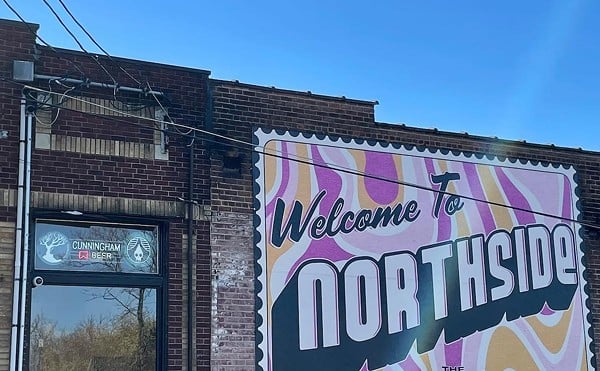|
Where do you go to find living, breathing literature these days? Does such a thing even exist? Maybe you can find its approximation in bookstores and libraries but, even so, that's print on the page, a rewarding but passive experience. Enter Richard Buckner from stage west, the intense singer/songwriter who just released The Hill, his song adaptation of Edgar Lee Masters' classic, Spoon River Anthology.
Buckner, a transplanted Californian now living in Alberta, Canada, has quietly been creating a cache of brilliant song cycles ever since his first release, Bloomed, in 1994. Though he's become a fringe artist of several genres, such as Alternative Country, Folk, and even Appalachian strains, his cult following emerges for every solo live performance he gives.
Using 18 lyrical poems from Masters' book, Buckner combines them with some of the most haunting music of his career. The Hill follows a similar trail of his three earlier releases, embracing an impressionistic sound that entwines Buckner's dusk-stained voice with melodic fragments that flow into each other. Joey Burns on cello and bass and John Convertino on percussion help shade in the sonic textures.
"I got turned on to the book while working at a bookstore in San Francisco after college," says Buckner, who admired Master's ability to flesh out a character's heartbreaks in just a few lines.
"I always write and sometimes use writing exercises, like using a list of names to give me certain images and then trying to describe that character. Masters could give a huge visual with a small amount of words."
Masters used Spoon River, a fictional town, as the launching pad-locale for a chorus of voices reaching out from the grave. Each poem becomes a carved epitaph, a character's whole life chiseled out in cathartic verse. The Spoon River Anthology collects these hard-luck monologues to gather the vision of a community of saints, sinners, schemers, widows and more.
In listening to just a few pieces from The Hill, you can hear the plain-spoken grace of the characters, now ghosts recalling what led them to their isolation and defeats. Check out "Reuben Pantier": "But my soul was 3000 miles away/In the days when you taught me in Spoon River./And just because you no more could love me/Nor pray for me, nor write me letters/The eternal silence of you spoke instead."
Drawing from the source of another writer's words is a first for Buckner. "It was a good move for me, and it's causing a turn in the way I write songs now," he says. Ironically, Richard's own lyrics have been a major strength of his work to this point: Few other songwriters fuse personal testimony with such poetic verve.
His second record, Devotion and Doubt, charts a burned-out drifter's travelogue of broken relationships and last chances. It's a seamless, intensely private work that's riveting in its revelations. In its vulnerability, Devotion and Doubt is Buckner's own Blood on the Tracks, Bob Dylan's pièce de résistance, an accumulation of ache piled up at truth's doorway.
"Of all my records, Devotion and The Hill hold more of me on them than the others," Buckner says.
There's no denying the darkness that runs through all of Buckner's music. From the Bluegrass strains of his A Cappella songs that recall Ralph Stanley's lonesome tenor to the ragged strands of Since, his only record with a full band, he tracks the shadows that haunt him.
He explains, "Realism is always dark. I mean, that's just the way it is." The Hill taps into Masters' realism and offers hard-won wisdom from beyond the grave. In perhaps the disc's centerpiece song/poem, "Elizabeth Childers," he sings of life's eternal disillusion from the point of view of a mother who has lost her child during birth. The resounding lines, "It's blood that calls to our blood/And what's your sorrow?/Child, child!/Death is better than life," echo the thematic heart of The Hill.
To release such a personal work, Buckner left the contract he'd had with MCA for his first couple of records. But it sounds like it was a very mutual decision.
"I began thinking of this project while I was on MCA," Buckner says. "But they didn't like my own songs, much less some obscure 100-year-old poems. I kind of fell deep beneath the cracks."
And the relief in his voice is obvious, for a mainstream label can offer very little to an artist who has always gone his own way and sought his own vision.
"These songs are still relevant even today," Buckner says. "We're still dealing with the same things in our lives."
Plain and simple, Buckner has one of those great, rich voices that strikes you with its hushed intimacy as it plumbs emotion from the well beneath each word. It's a voice that hearkens back to earlier eras, ancient ones even, when things like honor, truth, and salvation were at stake. Masters' poetry, published in 1915, and Buckner's voice and grainy music even recall the Civil War and its aftermath, the twisted loyalties and deep hurts.
Soon Buckner will be speaking to a high school class in Chicago about Masters' book and his own multigenre project. Who knows if today's teen-agers — the baggy-jeaned, Hip Hop obsessed variety — will relate to these pain-wracked tales etched in woe.
Regardless, Richard Buckner's The Hill offers us literature in the best sense, not the stale, two-dimensional kind we teach in schools to kids who couldn't care less because it doesn't impact their lives, but the pulsing, transformative stories that always matter.
RICHARD BUCKNER appears live at The York St. Cafe on Thursday.





